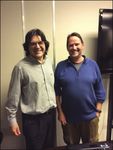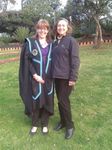Edu-Brief - University of Johannesburg
←
→
Page content transcription
If your browser does not render page correctly, please read the page content below
A panel discussion
World Federation of on teacher education
Associations for Teacher in Africa
Education meeting Prof. Sarah Gravett, the Dean of the Faculty of
and Conference Education was invited to participate in a panel
discussion on teacher education in Africa at a meeting
of the African Deans of Education Forum in Addis
Ababa, 23-24 June 2016. The theme of the panel
discussion was: Sharing “best practices” in teacher
education in Africa. Prof Gravett focused in her
presentation on the school-university partnership for
the education of primary school teachers at the UJ
Soweto campus. This work is well summarized in an
article that was published in the Mail & Guardian
article: http://mg.co.za/article/2016-06-15- 00-good-
teacher-graduates-emerge-when-their-
studies-combine-theory-and-reality
In the picture: Dr Whitty Green, Acting Chief Director Teaching
and Learning Development (Department of Higher Education and
Training) and Prof Sarah Gravett
Prof Sarah Gravett, Dean of Education, was invited in her
capacity as chair of the (South African) Education Deans’ Forum
to attend a meeting of the World Federation of Associations for
Teacher Education in Barcelona in April 2016. Thereafter she
delivered an invited paper at the Fourth Biennial International
Conference of the Federation. The theme of the conference was
“Innovation in Teacher Education within a Global Context”.
2 Edu-Brief@UJResearch on MiniChess and its influence on
mathematics knowledge acquisition and cognitive
development among foundation phase learners
Research by Professor Kakoma Luneta (UJ), Dr P. Giannakopoulos
(UNISA), Mrs S. Coetsee (UJ) and Mr G. Cheva (UJ)
The Department of Childhood Education in the Faculty of Education of the University of Johannesburg in collaboration
with Tsogo Sun, Moves for Life and MiniChess undertook to investigate the effects of chess on mathematical acquisition
at foundation phase (Grades R-3). The study involved 10 primary schools and 4568 learners. Of the 10 schools 6 were
experimental (Chess playing schools) and 4 were control schools (non-chess playing schools). They were all from the same
social and economic settings. It is currently the largest study involving foundation phase learners, chess and mathematics
in the world. In January 2014 the learners in the grades R-3 wrote pre-tests in mathematics developed by the Department
of Basic Education. Soon after the tests were written the learners at the experimental schools embarked on learning to play
chess. The experimental schools had 1 hour of chess every week. After one year of learning and playing chess, in January of
2015 the learners were again tested.
Over the one year period the control grades had a
very little shift in mathematics attainment, an average
of 0.25%, while the experimental group had an
average mathematical knowledge acquisition shift
of 7.89%. The Grade 2 experimental group had the
highest shift of 13%.
The experimental learners were much calmer
and spent time thinking about the mathematical
problems before they answered. The control group
were quick to respond and guess the answers.
When asked to explain what the problem meant,
the learners in the experimental group had several
alternatives to the meaning of the question.
It can be concluded from the above statements that
the different levels of analysis between the learners
playing chess and those that were not playing chess
was quite marked. Those playing chess were more
analytical and seemed to engage with the tasks at a
relatively higher cognitive level than the learners that
were not playing chess.
This study is ongoing and there is still one more year
of data collection and analysis.
3 Edu-Brief@UJIntermediate phase students build models for
science teaching
Francois Naude
The third year B.Ed Intermediate Phase students built interactive models to assist them in teaching science concepts. The
project entailed the creation of a 3D model that learners would be able to interact with to aid in the learning of difficult
science concepts. An exhibition was held on 28 April 2016 at Funda UJabule Primary school to put these models to the test.
Five groups of students presented their models to 80 grade 5 learners and their teachers. The learners interacted with the
models and asked questions. The students spent 10 weeks designing and building their models and their hard work paid
off. The student teachers were astonished to see the interest that the models invoked as the learners were extremely excited
that they were allowed to interact with the models and the teachers in a less formal manner.
4 Edu-Brief@UJThe five 3-minute thesis participants: The five participants in the 2016 competition were, from left to right: Peter Kriel (Thesis title:
Hospitality management in the SA higher education sector), Roger Looyen (Moral leadership: An imperative to learner attainment),
Mampaine Maphuta (School principals’ perceptions of the role of communities of practice in their professional development),
Graeme Edwards (Female leadership in disadvantaged communities), and Peter Ayuk (Institutional culture and effectiveness of a
private higher education institution in South Africa) on the far right.
Faculty’s 2nd annual 3-minute thesis
competition winner announced
The idea of a 3-Minute Thesis (3MT)
Competition was developed by the
University of Queensland in Australia,
in order to develop PhD candidates’
abilities to communicate their research
in maximum three minutes to a wider
audience. On the 10th of June, the
Faculty of Education hosted its 2nd
annual 3-minute thesis competition.
All doctoral students in the Faculty,
who were in their last year of study in
2016, were eligible to participate in
the event. This was quite a challenge
to participants, because besides
the 3 minute time limit, they were
allowed to use just one PowerPoint
slide to introduce the rationale
underlying their studies, their research
methodologies, their main findings
and the potential implication of their
inquiries.
Prizegiving: Peter receives the winner’s prize from Dr Joseph Divala, the chair of the
Mr Peter Ayuk, who is a member
adjudicators.
of staff at Milpark Education was
eventually crowned as the 2016 Jacobs, based on a thesis entitled: Institutional culture and effectiveness of a
winner. Peter will be completing his private higher education institution in South Africa. He will now progress to the
doctoral studies at the end of 2016, University’s 3 min-thesis competition, where all Faculty winners will be competing
under the supervision of Prof Gerrie for institutional glory.
5 Edu-Brief@UJA Miracle Master’s
By Jean Fourie and Mariëtte Loubser
English in
Education Seminar
The Department of Education and Curriculum Studies
continues to host the English in Education Seminar Series
chaired by Dr David Robinson. The first seminar of 2016 was
presented by Gordon Froud of the Faculty of Art, Design
and Architecture. The topic of the seminar was Alice and
the Illustrators, and it addressed the many ways in which
Lewis Carroll’s Alice’s Adventures in Wonderland has been
envisaged by illustrators over a period of time. The range
In 2012 Mariëtte Loubser started reading for her Master’s of illustrators included the original images by Lewis Carroll
in Inclusive Education. She was enthusiastic and made himself, the most famous images of John Tenniel, and more
considerable and excellent progress with her research on recent re-imaginings by a range of artists including Gordon
learners with special needs. Being an outstanding all- Froud himself. A vast number of images were presented
rounder as well, she began skydiving the following year. with commentary, and the appreciative audience became
Unfortunately, disaster struck during her second static aware of the significance of Alice in academic environments
line jump at 3600 feet when her parachute failed to open as well as in popular culture. The audience included
completely. After an uncontrollable plummet, she landed academics and teachers from a range of schools, as well as
on a pile of building rubble and sustained serious injuries. school students.
She suffered fractures of eight ribs (with penetration of her
The seminar was based on an academic paper originally
left lung), her pelvis and both hips, some vertebrae, and her
presented at a conference, the focus of which was Lewis
left tibia. She also sustained traumatic brain injury and facial
Carroll’s novel, at Cambridge University, in 2015 – the 150th
damage. She spent a month in intensive care, followed
anniversary of the publication of Alice’s Adventures in
by three months in rehabilitation during which she had to
Wonderland.
learn to communicate and walk again. Because of the head
trauma she could not remember much of her studies before
the accident. However, in spite of the severe obstacles
posed by an impaired working memory and continual pain,
she refamiliarised herself with her research and resumed it
with focused determination. Her courage and persistence
won dedicated support from her family, supervisor, work
colleagues, therapists and editor. She graduated in June
2016 with a Master’s focusing on avoidance of learning
responsibility among learners with special needs. In
assuming self-driven responsibility for one’s learning in spite
of any other impediments, Mariëtte herself has set a shining
example for all learners and students.
6 Edu-Brief@UJEditorial
There are several articles that indicate that the faculty Academic work is often known for its comprehensive,
of Education is engaged in significant work relating to detailed and thorough engagements with ideas and
teaching and learning, and there is evidence of a strong thinking processes. The three minute thesis competition
engagement with the community. flies in the face of this, because it requires researchers to
Prof Sarah Gravett has made a strong contribution to present their work in a concise and yet complete manner.
the discussion about education in her presence and The value of the succinct statement, and clarity of thinking,
presentations of papers in settings that involve continental is emphasised.
issues relating to education. It is of value that UJ’s Faculty A Master’s degree is challenging enough, but one of the
of Education has a notable profile at events such as those students in the faculty overcame great difficulty in her
mentioned in the articles. studies after experiencing an accident while sky-diving.
The importance of mathematics education, and its link Mariette Loubser showed great personal courage and
to chess, is reported in an article that reflects academic commitment in pursuing her studies after the accident. Her
commitment to learning and the community. South Africa’s determination to complete her studies is something from
numeracy rate is of national concern and this research which all students can learn.
therefore has significance. The English in Education seminar series run by the
The Funda Ujabule School is regularly featured in EduBrief, Department of Education and Curriculum Studies is
and it is worth repeating that this school is unique in that ongoing. The report on the seminar presented by
it is a functioning school linked to a university Faculty of Gordon Froud indicates that English is a multi-modal
Education. Teaching and learning therefore take place in communication space, and that illustrations interact with,
an authentic environment. The science education models and enhance, the meaning of the written word.
mentioned in the article provide evidence of the creative The range of activities – in areas of research, teaching
and innovative thinking that underpins this learning. and learning, and community engagement – are well-
represented in this issue of EduBrief. There is a sense of a
Faculty that is healthy and ever-evolving.
Editorial Team
Editor: David Robinson
Marketing: Prudence Mohau
Design and Layout: UJ Graphic Studio
Executive Management: Juliet Perumal
7 Edu-Brief@UJYou can also read



























































